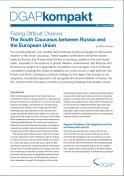The mounting tension over Ukraine has introduced numerous dangers to the security situation in the South Caucasus. These negative ramifications are further exacerbated by the fact that Russia holds the key to resolving conflicts in the post-Soviet realm, especially in the absence of greater Western assertiveness. But Moscow and Brussels are caught up in geopolitical competition over the region. Such continued competition prolongs the cycles of instability and could sooner or later spill over into Russia and the EU. Devising a coherent strategy for the region that focuses on an integrated, coordinated approach and recognizes the shared interests of Russia, the EU, and the South Caucasus countries is a pressing challenge that remains unmet.
Much of what happens today in the South Caucasus resembles the turmoil of the pre-Soviet era, especially the period between the two world wars. As was the case then, Armenia, Azerbaijan, and Georgia are currently facing a daunting task: finding a way to safeguard their state sovereignty and their national security. Because of its unique geostrategic position, the region is of crucial significance for the evolution of the 21st-century world order. While competition for energy resources has always been a highly geopolitical issue, the rivalry over control and influence in the South Caucasus has taken on ideological connotations, and the region has acquired even greater strategic importance to Russia and the European Union.
The nations of the South Caucasus today are confronted with a momentous choice: whether to repeat the history of the early 1920s, when the Soviet Union was created, or to repeat the history of the late 1940s, when the Mar - shall Plan was proposed. It should hardly be surprising to see the return of broader geopolitical concerns, and these raise interesting yet sensitive questions: Will the current and future circumstances of competition resemble those of 1917–20 or those of 1947–49? How has the content of that competition changed? Can Russia, the EU, and the South Caucasus find a way to cooperate internationally in ventures that unite them in the reconstruction of greater Europe, or will they fail to meet that challenge? This text analyzes the complex nature of the policies of Russia and the EU toward the neighborhood they share and examines possible ways in which the EU, Russia, Armenia, Azerbaijan, and Georgia could devise new approaches for mutually beneficial cooperation based on recognizing the interests of all parties involved.
Find the full article in the box to the right.
